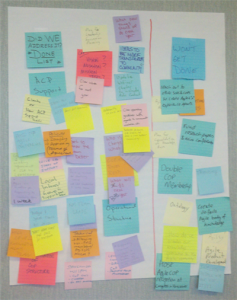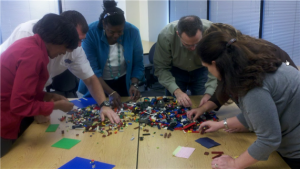 Before we went our separate ways, the PMI Agile CoP Strategic Planning team did a retrospective (not depicted in the image enclosed). I had a few key comments. First, as a positive, I felt like I finally understood where the PMI Agile Community of Practice was in its evolution. Second, I honestly think we are going in the right direction.
In the negative, my comment was a bit tempered. I thought the time we had was too short. But I understand the need for us to set short timeboxes and then deliver something of value. Without deadlines, we would probably debate things to death.
Before we went our separate ways, the PMI Agile CoP Strategic Planning team did a retrospective (not depicted in the image enclosed). I had a few key comments. First, as a positive, I felt like I finally understood where the PMI Agile Community of Practice was in its evolution. Second, I honestly think we are going in the right direction.
In the negative, my comment was a bit tempered. I thought the time we had was too short. But I understand the need for us to set short timeboxes and then deliver something of value. Without deadlines, we would probably debate things to death.
Right now, I am emotionally exhausted. I arrived mid-day Saturday (12/3) and I am returning home mid-day Tuesday (12/6). We had group discussions, sidebar discussions, and even discussions during and after every meal!
Everyone was passionate about his or her perspectives and I don't think there was a single topic that didn't require lengthy debate, reflection, and decisions. There were times I felt we were going down rat holes, debating the language that we should and would agree on. But, without those passionate conflicts, we wouldn't have explored the possibilities or arrived at better outcomes.
Thank you to PMI (Rory, Priya, and Brenard) for taking care of everything and allowing the team to come together and focus on the important work at hand. The Agile CoP is very young and it was important for us to focus on critical areas to continue growing a community that is self-sustaining, transparent, and supportive.
Thank you to the core team of Ainsley, Bob, Dean, Devin, and Sameer (alphabetical order) for speaking your minds and standing your ground.
A very special thank you goes to Jesse, Dennis, and Brian. Over the course of a few days, you accomplished great things. The community and PMI both owe you a lot.
Outside of our planning group, as our community grows even larger, I ask for patience and participation from both traditional and agile project managers. The Agile CoP leadership want to be as transparent as possible. As goals become more ambitious, the need for volunteers (and future servant-leaders) will grow.
In closing, I want readers to remember, we want the PMI members worldwide to be equipped to lead and thrive in a human-centric and ever changing world by embracing adaptive and empirical proactive practices.
I am left inspired.
 I am back from the PMI Global Congress in Vancouver, British Columbia.
My lack of fancy pants went pretty much unnoticed. I brought plenty of energy (and coffee) to my session and it appears people were very happy with the results. I was referred to, at one point, as the Energizer Bunny and even the PMI quoted me.
I am back from the PMI Global Congress in Vancouver, British Columbia.
My lack of fancy pants went pretty much unnoticed. I brought plenty of energy (and coffee) to my session and it appears people were very happy with the results. I was referred to, at one point, as the Energizer Bunny and even the PMI quoted me.





